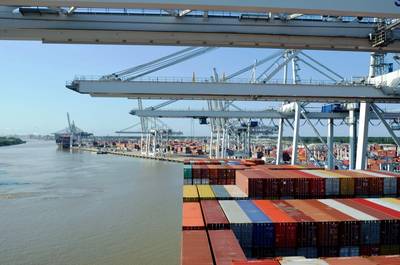US Container Shippers Slow Walk New Contracts, Eye Easing of Red Sea Rate Hikes
U.S. importers are playing the waiting game with new container shipping contracts, gambling the rate spike from Red Sea vessel attacks will fade and put them in a stronger negotiating position, shipping industry analysts said.
Iran-aligned Houthi missile and drone attacks on commercial ships in the Red Sea have forced most container carriers to reroute vessels around Africa and sent spot rates soaring.
That price shock is a "gift" that carriers will be giving back when the assaults stop, said Alan Murphy, CEO of Sea-Intelligence Maritime Analysis at S&P Global's TPM24 conference this week in Long Beach, California.
That annual event marks the unofficial kickoff of haggling over price and volume agreements on the busy trans-Pacific trade lane. The resulting contracts covering container cargo such as sneakers, sofas, televisions, steering wheels and coffee generally start on May 1.
It costs an estimated $1 million more to send a hulking container ship around Africa's Cape of Good Hope versus through the Red Sea and the Suez Canal.
Higher costs, combined with the upending of global vessel schedules, have pushed spot rates significantly above negotiated contract rates, even on unaffected routes like the trans-Pacific.
The cost to send a 40-foot (12-m) container from Shanghai to Los Angeles in the off-contract spot market topped out at $4,900 in February, according to ocean shipping pricing data provider Xeneta.
That rate since has fallen to around $4,300, but remains more than twice as high as the contract rate of around $2,000, according to Peter Sand, chief analyst at Xeneta.
Chris Rogers, head of supply chain research at S&P Global Market Intelligence, said spot rates have risen more than costs.
"We don't know where rates are going to settle yet," he said.
Top container shippers like retail giant Walmart set the tone for the contract season and have not yet struck deals, industry consultant Jon Monroe said. Walmart supply chain executives attending TPM24 declined to comment on the negotiations.
Half a dozen other large and small trans-Pacific shippers told Reuters they are holding out on the expectation that spot rates will ease further in the coming weeks.
Several pointed to comments from carriers such as Denmark's Maersk, which warned the delivery of new ships would exacerbate oversupply and keep a lid on what it can charge customers.
"Nobody wants to negotiate at peak," said Stephanie Loomis, Americas head of ocean freight for Rhenus Logistics.
(Reuters - Reporting by Lisa Baertlein; Editing by Jamie Freed)

















